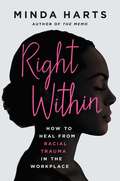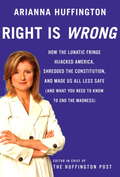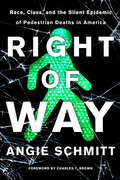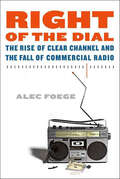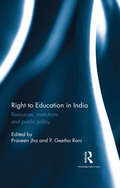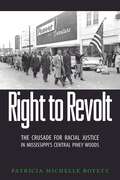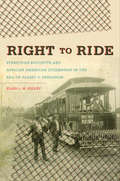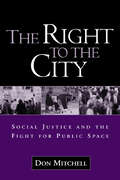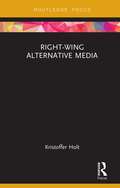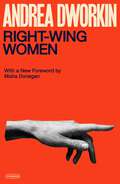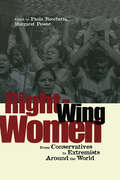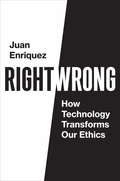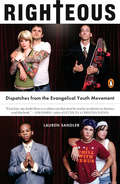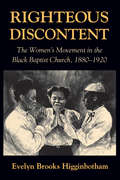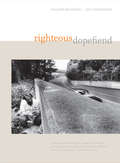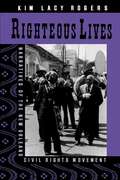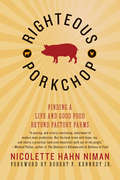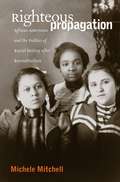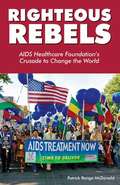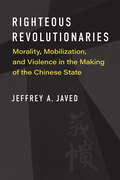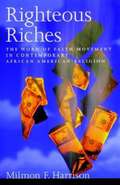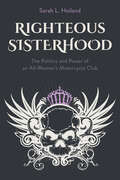- Table View
- List View
Right Within: How to Heal from Racial Trauma in the Workplace
by Minda HartsFrom the powerhouse author of The Memo, the essential self-help book for women of color to heal—and thrive—in the workplace In workplaces nationwide, women of color need frank talk and honest advice on how to deal with microaggressions, heal from racialized trauma, and find relief from invisible workplace burdens. Filled with Minda Harts&’s signature wit and warmth, Right Within offers strategies for women of color to speak up during racialized moments with managers and clients, work through past triggers they may not even know still cause pain, and reframe past career disappointments as opportunities to grow into a new path. Through action points, exercises, and clear-eyed coaching, Harts encourages women to summon hidden reserves of strength and courage. She includes advice from therapists and faith leaders of color on a full range of ways to heal. Right Within will help women of color strengthen their resolve across corporate America, ensuring that we can all, finally, rise together.
Right is Wrong
by Arianna HuffingtonWith her trademark passion, intelligence, and devastating wit, Huffington Post editor in chief Arianna Huffington tackles the issues that are crucial to this year's presidential election and, even more so, to the fate of the country.Huffington makes the case that America has been hijacked from within by a radical element--the "lunatic fringe" of the Right that has taken over the Republican Party. Despite holding views at odds with the majority of Americans, these zealots have given us an endless war in Iraq, a sputtering economy, a health care system on life support, a war on science and reason, and an immoral embrace of torture.But they haven't done it on their own: they have been enabled by a compliant media that act as if there is no such thing as truth and are more interested in cozying up to those in power than in holding them accountable, and by feckless Democrats who have allowed themselves to be intimidated into backing down again and again.Both a withering indictment and a hopeful call to arms, Right Is Wrong is an explosive, boldly incisive work that will help set the national agenda.From the Hardcover edition.
Right of Way: Race, Class, and the Silent Epidemic of Pedestrian Deaths in America
by Angie SchmittThe face of the pedestrian safety crisis looks a lot like Ignacio Duarte-Rodriguez. The 77-year old grandfather was struck in a hit-and-run crash while trying to cross a high-speed, six-lane road without crosswalks near his son's home in Phoenix, Arizona. He was one of the more than 6,000 people killed while walking in America in 2018. In the last ten years, there has been a 50 percent increase in pedestrian deaths.The tragedy of traffic violence has barely registered with the media and wider culture. Disproportionately the victims are like Duarte-Rodriguez—immigrants, the poor, and people of color. They have largely been blamed and forgotten.In Right of Way, journalist Angie Schmitt shows us that deaths like Duarte-Rodriguez's are not unavoidable "accidents.&” They don't happen because of jaywalking or distracted walking. They are predictable, occurring in stark geographic patterns that tell a story about systemic inequality. These deaths are the forgotten faces of an increasingly urgent public-health crisis that we have the tools, but not the will, to solve. Schmitt examines the possible causes of the increase in pedestrian deaths as well as programs and movements that are beginning to respond to the epidemic. Her investigation unveils why pedestrians are dying—and she demands action. Right of Way is a call to reframe the problem, acknowledge the role of racism and classism in the public response to these deaths, and energize advocacy around road safety. Ultimately, Schmitt argues that we need improvements in infrastructure and changes to policy to save lives.Right of Way unveils a crisis that is rooted in both inequality and the undeterred reign of the automobile in our cities. It challenges us to imagine and demand safer and more equitable cities, where no one is expendable.
Right of the Dial: The Rise of Clear Channel and the Fall of Commercial Radio
by Alec FoegeIn Right of the Dial, Alec Foege explores how the mammoth media conglomerate evolved from a local radio broadcasting operation, founded in 1972, into one of the biggest, most profitable, and most polarizing corporations in the country. During its heyday, critics accused Clear Channel, the fourth-largest media company in the United States and the nation's largest owner of radio stations, of ruining American pop culture and cited it as a symbol of the evils of media monopolization, while fans hailed it as a business dynamo, a beacon of unfettered capitalism. What's undeniable is that as the owner at one point of more than 1,200 radio stations, 130 major concert venues and promoters, 770,000 billboards, 41 television stations, and the largest sports management business in the country, Clear Channel dominated the entertainment world in ways that MTV and Disney could only dream of. But in the fall of 2006, after years of public criticism and flattening stock prices, Goliath finally tumbled—Clear Channel Inc. sold off one-third of its radio holdings and all of its television concerns while transferring ownership to a consortium of private equity firms. The move signaled the end of an era in media consolidation, and in Right of the Dial, Foege takes an insightful look at the company's successes and abuses, showing the ways in which Clear Channel reshaped America's cultural and corporate landscapes along the way.
Right to Education in India: Resources, institutions and public policy
by Praveen Jha P. Geetha RaniThis is one of the first volumes to comprehensively discuss resource constraints and institutional challenges in realizing the Fundamental Right to Education (RTE) in India. It looks at various aspects of the Sarva Shiksha Abhiyan (SSA), the primary vehicle to implement RTE and a flagship programme to universalize elementary education in the country. The book presents a comparative perspective across regions and states and evaluates the effective delivery of SSA at the grassroots level. Using rich empirical data, not yet available in the public domain, it provides valuable lessons for the planning and financing arrangements of SSA-RTE between the centre and the states, and towards understanding access, equity and quality of education. The work will be a major resource for scholars and researchers of education, economics, public policy, development studies, and politics.
Right to Revolt: The Crusade for Racial Justice in Mississippi's Central Piney Woods
by Patricia Michelle BoyettOn January 10, 1966, Klansmen murdered civil rights leader Vernon Dahmer in Forrest County, Mississippi. Despite the FBI's growing conflict against the Klan, recent civil rights legislation, and progressive court rulings, the Imperial Wizard promised his men: “no jury in Mississippi would convict a white man for killing a nigger.” Yet this murder inspired change. Since the onset of the civil rights movement, local authorities had mitigated federal intervention by using subtle but insidious methods to suppress activism in public arenas. They perpetuated a myth of Forrest County as a bastion of moderation in a state notorious for extremism. To sustain that fiction, officials emphasized that Dahmer's killers hailed from neighboring Jones County and pursued convictions vigorously. Although the Dahmer case became a watershed in the long struggle for racial justice, it also obscured Forrest County's brutal racial history. Patricia Michelle Boyett debunks the myth of moderation by exploring the mob lynchings, police brutality, malicious prosecutions, and Klan terrorism that linked Forrest and Jones Counties since their founding. She traces how racial atrocities during World War II and the Cold War inspired local blacks to transform their counties into revolutionary battlefields of the movement. Their electrifying campaigns captured global attention, forced federal intervention, produced landmark trials, and chartered a significant post-civil rights crusade. By examining the interactions of black and white locals, state and federal actors, and visiting activists from settlement to contemporary times, Boyett presents a comprehensive portrait of one of the South's most tortured and transformative landscapes.
Right to Ride: Streetcar Boycotts and African American Citizenship in the Era of Plessy v. Ferguson
by Blair Murphy KelleyThrough a reexamination of the earliest struggles against Jim Crow, Blair Kelley exposes the fullness of African American efforts to resist the passage of segregation laws dividing trains and streetcars by race in the early Jim Crow era. Right to Ride chronicles the litigation and local organizing against segregated rails that led to the Plessy v. Ferguson decision in 1896 and the streetcar boycott movement waged in twenty-five southern cities from 1900 to 1907. Kelley tells the stories of the brave but little-known men and women who faced down the violence of lynching and urban race riots to contest segregation. Focusing on three key cities--New Orleans, Richmond, and Savannah--Kelley explores the community organizations that bound protestors together and the divisions of class, gender, and ambition that sometimes drove them apart. The book forces a reassessment of the timelines of the black freedom struggle, revealing that a period once dismissed as the age of accommodation should in fact be characterized as part of a history of protest and resistance.
Right to the City: Social Justice and the Fight for Public Space
by Don MitchellIn the wake of recent terrorist attacks, efforts to secure the American city have life-or-death implications. Yet demands for heightened surveillance and security throw into sharp relief timeless questions about the nature of public space, how it is to be used, and under what conditions. Blending historical and geographical analysis, this book examines the vital relationship between struggles over public space and movements for social justice in the United States. Presented are a series of linked cases that explore the judicial response to public demonstrations by early twentieth-century workers, and comparable legal issues surrounding anti-abortion protests today; the Free Speech Movement and the history of People's Park in Berkeley; and the plight of homeless people facing new laws against their presence in urban streets. The central focus is how political dissent gains meaning and momentum--and is regulated and policed--in the real, physical spaces of the city.
Right-Wing Alternative Media (Routledge Focus on Communication and Society)
by Kristoffer HoltThis book offers a fresh perspective on central questions related to right-wing alternative media: Can right-wing media be alternative? Why do they exist? Are they a threat to the existing order and what have the reactions been from mainstream politicians and media actors? The rise and success of right-wing populism in the political life of many western countries, along with several new and apparently successful alternative media operations on the right, has caused surprise and confusion among researchers and debaters. How should this challenge to mainstream politics and media be understood? Journalistic, political and academic discourse has struggled to explain these tendencies and tend to focus on sensational and extreme examples, with little attention directed towards other aspects. This book critically discusses existing theoretical frameworks related to alternative media in general, analysing a wide scope of cases to illustrate the diversity of voices in alternative media on the right and highlighting the importance of intellectual coolness and common sense in discussions about this important but ideologically and politically charged area. An important addition to the current discourse of contemporary media, Right-Wing Alternative Media is ideal for researchers, students and anyone interested in politics and public discourse.
Right-Wing Extremism in Canada (Palgrave Hate Studies)
by Barbara Perry Ryan ScrivensThis book comprehensively examines right-wing extremism (RWE) in Canada, discussing the lengthy history of violence and distribution, ideological bases, actions, organizational capacity and connectivity of these extremist groups. It explores the current landscape, the factors that give rise to and minimise these extremist groups, strategies for countering these groups, and the emergence of the ‘Alt-Right’. It draws on interviews with law enforcement officials, community activists, and current and former right-wing activists to inform and offer practical advice, paired with analyses of open source intelligence on the state of the RWE movement in Canada. The historical and contemporary contours of right-wing extremism in Canada are situated within the social, political, and cultural landscape that has shaped the movement. It will be of particular interest to students and researchers of criminology, sociology, social justice, terrorism and political violence.
Right-Wing Extremism in Canada and the United States (Palgrave Hate Studies)
by Barbara Perry Ryan Scrivens Jeff GruenewaldThis book is the first collection of scholarship featuring both Canadian and American scholarship on the resurgent right-wing extremist movement in the two countries. It is particularly timely given the recent rise in political populism that has engendered renewed activism from extreme right contingents. Trump’s right-wing populist and white nationalist political campaign has galvanized Canadian and American white supremacist ideologies, identities, movements and practices. Leading Canadian and American scholars are brought together to explore a contemporary array of current dynamics, patterns and characteristics associated with the movement in each country. Split into four sections, it provides an introduction to extremism in the 21st century, it examines studying extremism, forms of extremist activity and violence, and the responses. The collection allows comparisons to be drawn out from the distinct treatments of each country. It speaks to students as well as scholars in social sciences departments, including criminology, sociology, social justice, and terrorism, peace and security studies, and political-violence related programs.
Right-Wing Women
by Andrea DworkinWith a new foreword by Moira Donegan, this long-awaited reissue of Dworkin’s iconic study of women in American conservatism is paired with a bold, modern package to match Dworkin’s visionary perspective and style.Andrea Dworkin wrote Right-Wing Women in 1983—a crucial and deeply illuminating analysis of the right’s position on abortion, homosexuality, antisemitism, female poverty, and antifeminism. Forty years later, the book feels more vibrant, clear-eyed, and visionary than ever, especially as these issues get relitigated in both legal and public forums. In addition to her revelatory and nuanced portraits of figures like Anita Bryant and Phyllis Schlafly, and an examination of the roots of a distinctly woman-led brand of American conservatism, Right-Wing Women will give readers the thrill of rediscovering the force and elegance of Dworkin’s arguments and her skill as one of our most adept and prophetic feminist thinkers.
Right-Wing Women: From Conservatives to Extremists Around the World
by Margaret Power Paola BacchettaAn oft-neglected subject, right-wing women are an important component in understanding the many racist, fascist, and anti-feminist movements of the 20th century. Providing original research on an array of right-wing groups around the world, the contributors paint a disturbing and complicated portrait of the women involved in these movements. From Mussolini supporters to Klanswomen, this collection provides an eye-opening look at extremist women.
Right/Wrong: How Technology Transforms Our Ethics
by Juan EnriquezFrom the TED stage to the page, Juan Enriquez, author of As the Future Catches You and Evolving Ourselves, presents a lively and engaging guide to ethics in a technological age.Most people have a strong sense of right and wrong, and many of us are not reluctant to argue with someone who disagrees. But when we take an unyielding stand on something we regard as an eternal truth, we forget that ethics evolve over time. What was once broadly acceptable is now completely unacceptable. For example, burning heretics is no longer considered a just punishment. Child marriage is not applauded as a family value. Many shifts in the right vs. wrong pendulum are affected by advances in technology. In Right/Wrong, Juan Enriquez reflects on the evolution of ethics in a technological age.
Righteous
by Lauren SandlerIlluminating, often troubling, and unapologetically frank, Righteous is dynamic young journalist Lauren Sandler's report from the nexus of religious fundamentalism and youth culture. As a secular guide through the passion and politics of the teenage evangelical "Disciple Generation," Sandler offers the first front line exploration of the Christian youth counterculture and what its influence could mean for the future of America. She intimately connects with skateboarding missionaries, tattooed members of a self-sufficient postpunk mega- church, rock- 'n'-rolling antiabortion protestors, and rap preachers who merge hip-hop's love of money with old- fashioned Bible-beating fundamentalism-true believers who reveal themselves with openness and truly astonishing candor, but what they reveal about our nation is most astonishing of all. .
Righteous Discontent: The Women’s Movement in the Black Baptist Church, 1880–1920
by Evelyn Brooks HigginbothamWhat Du Bois noted has gone largely unstudied until now. In this book, Evelyn Brooks Higginbotham gives us our first full account of the crucial role of black women in making the church a powerful institution for social and political change in the black community. Between 1880 and 1920, the black church served as the most effective vehicle by which men and women alike, pushed down by racism and poverty, regrouped and rallied against emotional and physical defeat. Focusing on the National Baptist Convention, the largest religious movement among black Americans, Higginbotham shows us how women were largely responsible for making the church a force for self-help in the black community. In her account, we see how the efforts of women enabled the church to build schools, provide food and clothing to the poor, and offer a host of social welfare services. And we observe the challenges of black women to patriarchal theology. Class, race, and gender dynamics continually interact in Higginbotham’s nuanced history. She depicts the cooperation, tension, and negotiation that characterized the relationship between men and women church leaders as well as the interaction of southern black and northern white women’s groups. Higginbotham’s history is at once tough-minded and engaging. It portrays the lives of individuals within this movement as lucidly as it delineates feminist thinking and racial politics. She addresses the role of black Baptist women in contesting racism and sexism through a “politics of respectability” and in demanding civil rights, voting rights, equal employment, and educational opportunities. Righteous Discontent finally assigns women their rightful place in the story of political and social activism in the black church. It is central to an understanding of African American social and cultural life and a critical chapter in the history of religion in America.
Righteous Dopefiend (California Series in Public Anthropology #21)
by Philippe Bourgois Jeffrey SchonbergThis powerful study immerses the reader in the world of homelessness and drug addiction in the contemporary United States. For over a decade Philippe Bourgois and Jeff Schonberg followed a social network of two dozen heroin injectors and crack smokers on the streets of San Francisco, accompanying them as they scrambled to generate income through burglary, panhandling, recycling, and day labor. Righteous Dopefiend interweaves stunning black-and-white photographs with vivid dialogue, detailed field notes, and critical theoretical analysis. Its gripping narrative develops a cast of characters around the themes of violence, race relations, sexuality, family trauma, embodied suffering, social inequality, and power relations. The result is a dispassionate chronicle of survival, loss, caring, and hope rooted in the addicts' determination to hang on for one more day and one more "fix" through a "moral economy of sharing" that precariously balances mutual solidarity and interpersonal betrayal.
Righteous Lives: Narratives of the New Orleans Civil Rights Movement
by Kim Lacy RogersAn emotionally evocative, richly textured history based on autobiographical accounts of those who lived and shaped the struggle. The importance of many of Rogers' subjects and the uniqueness of New Orleans make this must reading for anyone interested in the history of the movement. But those interested in oral history and African-American autobiography will find riches aplenty as well. A welcome addition to a number of literatures--Doug McAdam, author of Freedom Summer Righteous Lives skillfully blends oral history with a perceptive analysis of three generations of civil rights leadership in New Orleans. Rogers has revealed not only what people did, but what they remember, and how their assessments of their activism have changed over time.--Donald A. Ritchie, U.S. Senate Historical Office "Rogers paints a slightly less rosy picture, one in which the Louisiana un-American Activities Committee staged a raid on the offices of the Southern Conference Educational Fund (SCEF), and the City Council passed laws prohibiting the right to peaceful assembly, paving the way to jailing protesters."-Gambit Weekly This important study provides fresh insights into the lives of both black and white civil rights leaders, documents the diversity of individuals and motivations, and traces movement history in a major southern city. Well written and well researched, this book is highly recommended for readers at all levels.--Choice Charts the distinctly different experiences and memories of 25 black and white civil rights activists of three 'generations' in New Orleans, opening with a deft sketch of the city's unusual racial background with its black Creole caste.--Publishers Weekly An important study, full of valuable information, profoundly moving testimony, and provocative insights.--The Journal of Southern History A major contribution to our understanding of the civil rights movement. RIGHTEOUS LIVES illustrates the complexity of movements for social change, the long history of seemingly spontaneous conflicts, and the personal consequences of political activism. Rogers reveals how issues of caste and class, of gender and generation divided the black community in New Orleans, while her in-depth interviews and observations bring to the surface previously unexamined contradictions within the white southern experience as well. RIGHTEOUS LIVES also offers perceptive and thought-provoking insights into broader issues of collective and individual memory, life history, and autobiography. It evokes the struggle for African-American self-determination in the Crescent City with clarity and conviction, and it stands as a fitting testimonial to the courageous men and women whose voices provide so much of the book's fascinating narratives and textures.-- George Lipsitz, University of California, San Diego When former Ku Klux Klan Grand Wizard David Duke campaigned for governor in late 1991, race relations in Louisiana were thrust dramatically into the national spotlight. New Orleans, the political and economic hub of the state, is in many ways representative of Louisiana's unique racial mix, a fusion of African-American, Caribbean, European, and white Southern cultures. An old, colorful port famous for its French and Spanish heritage, distinctive architecture, and jazz, New Orleans was a peculiarly segregated city in the 1950s and 1960s. Yet, despite its complicated racial and ethnic identity and heated desegregation battles, New Orleans, unlike other Southern cities such as Birmingham, did not explode. In this moving work, Kim Rogers tells the stories, in their own words, of the New Orleans' civil rights workers who fought to deter the racial terrorism that scarred much of the South in the 1950s and 1960s. Spanning three generations of activists, RIGHTEOUS LIVES traces the risks, triumphs, and disappointments that characterized the lives of New Orleans activists. Chronicling watershed moments in the movement, Rogers' compelling narr
Righteous Porkchop
by Nicolette Hahn NimanWhen Robert F. Kennedy, Jr., first asked Nicolette Hahn Niman to head up his environmental organization's "hog campaign," she balked. Investigating hog manure pollution was hardly the glamorous assignment she pictured when leaving everything to work for him in New York. But Kennedy, she discovered, is not a man who takes no for an answer. Thus began Niman's fascinating odyssey into the inner workings of the "factory farm" industry and her transformation into an intrepid environmental lawyer who goes up against the big business farming establishment and-unexpectedly-finds love along the way. Starting her work for Kennedy's organization in North Carolina, Niman uncovers the shocking practices of hog factory farms, including inhumane animal confinement and devastating water and air pollution. She organizes a national reform movement to fight these practices and shows again and again that livestock farming can be done in a better way-not only for hogs, but also for poultry, fish, and dairy cows. Through Niman's work, she also tours the best of farms, where traditional farmers and ranchers treat their animals humanely and have joined with other farmers to successfully market the foods they produce. She profiles the innovative and cost-effective methods these operations have incorporated to make a profit by ethical, sustainable means. Along the way, the story takes a surprising turn when Nicolette is swept off her feet by a high-profile cattle rancher. At first, they seem an unlikely pair: Nicolette, a thirty-something, urban, East Coast, vegetarian attorney, and Bill Niman, an older, West Coast, cowboy type. But they share a passion for raising animals with kindness, and she soon finds herself transitioning to ranching life at the famed Niman Ranch in Northern California. In telling her story, Niman details not only why to choose meat, poultry, dairy, eggs, and fish from traditionally farmed sources (and avoid products tainted by chemicals and antibiotic-resistant bacteria), but also how to do so. She reveals what to look for on labels, why to skip animal products from outside the United States, and what questions to ask when eating out. A searing account of an industry gone awry and one woman's passionate fight to remedy it, Righteous Porkchop is a must-read for anyone who cares about food sources or good eating.
Righteous Porkchop
by Nicolette Hahn NimanWhen Robert F. Kennedy, Jr., first asked Nicolette Hahn Niman to head up his environmental organization's "hog campaign," she balked. Investigating hog manure pollution was hardly the glamorous assignment she pictured when leaving everything to work for him in New York. But Kennedy, she discovered, is not a man who takes no for an answer. Thus began Niman's fascinating odyssey into the inner workings of the "factory farm" industry and her transformation into an intrepid environmental lawyer who goes up against the big business farming establishment and--unexpectedly--finds love along the way. Starting her work for Kennedy's organization in North Carolina, Niman uncovers the shocking practices of hog factory farms, including inhumane animal confinement and devastating water and air pollution. She organizes a national reform movement to fight these practices and shows again and again that livestock farming can be done in a better way--not only for hogs, but also for poultry, fish, and dairy cows. Through Niman's work, she also tours the best of farms, where traditional farmers and ranchers treat their animals humanely and have joined with other farmers to successfully market the foods they produce. She profiles the innovative and cost-effective methods these operations have incorporated to make a profit by ethical, sustainable means. Along the way, the story takes a surprising turn when Nicolette is swept off her feet by a high-profile cattle rancher. At first, they seem an unlikely pair: Nicolette, a thirty-something, urban, East Coast, vegetarian attorney, and Bill Niman, an older, West Coast, cowboy type. But they share a passion for raising animals with kindness, and she soon finds herself transitioning to ranching life at the famed Niman Ranch in Northern California. In telling her story, Niman details not only why to choose meat, poultry, dairy, eggs, and fish from traditionally farmed sources (and avoid products tainted by chemicals and antibiotic-resistant bacteria), but also how to do so. She reveals what to look for on labels, why to skip animal products from outside the United States, and what questions to ask when eating out. A searing account of an industry gone awry and one woman's passionate fight to remedy it, Righteous Porkchop is a must-read for anyone who cares about food sources or good eating.
Righteous Propagation
by Michele MitchellBetween 1877 and 1930--years rife with tensions over citizenship, suffrage, immigration, and "the Negro problem--African American activists promoted an array of strategies for progress and power built around "racial destiny," the idea that black Americans formed a collective whose future existence would be determined by the actions of its members. In Righteous Propagation, Michele Mitchell examines the reproductive implications of racial destiny, demonstrating how it forcefully linked particular visions of gender, conduct, and sexuality to collective well-being.Mitchell argues that while African Americans did not agree on specific ways to bolster their collective prospects, ideas about racial destiny and progress generally shifted from outward-looking remedies such as emigration to inward-focused debates about intraracial relationships, thereby politicizing the most private aspects of black life and spurring race activists to calcify gender roles, monitor intraracial sexual practices, and promote moral purity. Examining the ideas of well-known elite reformers such as Mary Church Terrell and W. E. B. DuBois, as well as unknown members of the working and aspiring classes, such as James Dubose and Josie Briggs Hall, Mitchell reinterprets black protest and politics and recasts the way we think about black sexuality and progress after Reconstruction.
Righteous Rebels: AIDS Healthcare Foundation's Crusade to Change the World
by Patrick Range McDonaldIn this thought-provoking portrait of AIDS Healthcare Foundation, the world’s largest HIV/AIDS medical care provider, award-winning journalist Patrick Range McDonald reveals the nonprofit’s unlikely rise from a feisty grassroots organization during the 1980s AIDS crisis in Los Angeles to its position today as an aggressive, global leader in the ongoing fight to control HIV and AIDS. This riveting story highlights the motivations behind AHF’s life-saving efforts, its battles against (and alliances with) governments and various political establishments, and its work today to provide free HIV treatment and prevention services to vulnerable, lower-income people in more than thirty countries. <p><p> With unrestricted, insider access, McDonald follows AHF for a year as it clashes with the Obama administration, the state of Nevada, and the World Health Organization. He interviews AHF’s key players, including firebrand president Michael Weinstein, and he travels to AHF outposts around the globe, from Miami to Uganda, Cambodia to Russia, Estonia to South Africa. Along the way, McDonald discovers that AHF is a passionate, smart, and tenacious "people power” organization that brings hope and change to nearly all corners of the world. <p> Beyond its work as a highly effective global AIDS organization, the AHF story also provides a blueprint for every kind of righteous rebel who wants to make the world a better place.
Righteous Revolutionaries: Morality, Mobilization, and Violence in the Making of the Chinese State (China Understandings Today)
by Jeffrey A. JavedRighteous Revolutionaries illustrates how states appeal to popular morality—shared understandings of right and wrong—to forge new group identities and mobilize violence against perceived threats to their authority. Jeffrey A. Javed examines the Chinese Communist Party’s mass mobilization of violence during its land reform campaign in the early 1950s, one of the most violent and successful state-building efforts in history. Using an array of novel archival, documentary, and quantitative historical data, this book illustrates that China’s land reform campaign was not just about economic redistribution but rather part of a larger, brutally violent state-building effort to delegitimize the new party-state’s internal rivals and establish its moral authority. Righteous Revolutionaries argues that the Chinese Party-state simultaneously removed perceived threats to its authority at the grassroots and bolstered its legitimacy through a process called moral mobilization. This mobilization process created a moral boundary that designated a virtuous ingroup of “the masses” and a demonized outgroup of “class enemies,” mobilized the masses to participate in violence against this broadly defined outgroup, and strengthened this symbolic boundary by making the masses complicit in state violence. Righteous Revolutionaries shows how we can find traces of moral mobilization in China today under Xi Jinping’s rule. In an era where states and politicians regularly weaponize moral emotions to foment intergroup conflict and violence, understanding the dynamics of violent mobilization and state authority are more relevant than ever before.
Righteous Riches: The Word Of Faith Movement In Contemporary African American Religion
by Milmon F. HarrisonDoes God want us to be wealthy? Many people believe that God offers not only eternal joy in the hereafter but also material blessings in the here and now. Other Christians see this "prosperity theology," as nothing more than vulgar materialism, incompatible with orthodox Christianity. In Righteous Riches, Milmon F. Harrison examines the Word of Faith movement, an independent, non-denominational Christian movement that preaches the so-called "health and wealth gospel." <P><P> The Word of Faith movement is an international network loosely bound by a basic doctrine called the "Faith Message," which teaches that it is God's will for Christians to be prosperous, successful, and healthy in the present life. Drawing on his personal experiences as a former insider and in-depth interviews with members, Harrison takes us inside the movement, revealing what it is like to belong, and how people accept, reject, and reshape Word of Faith doctrines to fit their own lives. Although the movement is not exclusively African American, many of its most prominent and recognized leaders are African American ministers with large congregations and national television audiences. Analyzing the movement's appeal to African Americans, Harrison argues that, because of their history of oppression and discrimination, African American religious institutions have always had to address the material--as well as spiritual--concerns of their members. The Word of Faith Movement, he says, is one of several prosperity movements that resonate strongly with African Americans. Situating the movement in the contexts of both contemporary American religion and the history of the Black Church, Righteous Riches offers a fascinating look at a quintessentially American phenomenon.
Righteous Sisterhood: The Politics and Power of an All-Women's Motorcycle Club
by Sarah L. HoilandA righteous sister identifies herself as a biker. She might wrench, or maintain, her own bike, and she prefers to ride with other righteous sisters. Righteous Sisterhood is Sarah Hoiland’s insightful ethnography about an all-women motorcycle club (MC). She recounts stories of women bikers for whom riding in an MC is “an act of rebellion” and “liberating” even as it constrains—a reactionary populist version of the American Dream dipped in “girl power.” Granted unprecedented access to the MC’s initiation rituals, annual ceremonies, and the extensive socialization process, Hoiland investigates this fascinating subculture, why women choose to join, and why, in some cases, they exit or become exiled. Righteous Sisterhood also reveals complex and contradictory gender and political dynamics within the club and within the larger subculture. The MC provides a unique, liberatory, womanist space within the larger male-dominated MC social world, but these women remain outsiders, with political voices that are lost in the misogyny of alt-right spaces. As Hoiland emphasizes, the quest for righteous sisterhood is about finding individual excellence and camaraderie while seeking recognition and immortality within the MC.
